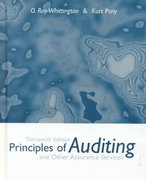Select the best answer for each of the following. Explain the reasons for your selection. a. In
Question:
Select the best answer for each of the following. Explain the reasons for your selection.
a. In which of the following situations would a CPA firm have violated the AICPA Code of Professional Conduct in determining its fee?
(1) A fee is based on whether or not the CPA firm's audit report leads to the approval of the client's application for bank financing.
(2) A fee is to be established at a later date by the Bankruptcy Court.
(3) A fee is based upon the nature of the engagement rather than upon the actual time spent on the engagement.
(4) A fee is based on the fee charged by the client's former auditors.
b. A CPA firm would not be considered in violation of the AICPA independence rules in which of the following instances?
(1) A partner's checking account, which is fully insured by the Federal Deposit Insurance Corporation, is held at a financial institution for which the CPA firm does attest services.
(2) A managerial employee of the firm donates service as vice president of a charitable organization that is an audit client of the firm.
(3) An attest client owes the firm fees for this and last year's annual engagements.
(4) A partner's five-year-old son owns stock in an attest client.
c. Which of the following is implied when a CPA signs the preparer's declaration on a federal income tax return?
(1) The return is not misleading based on all information of which the CPA has knowledge.
(2) The return is prepared in accordance with generally accepted accounting principles.
(3) The CPA has audited the return.
(4) The CPA maintained an impartial mental attitude while preparing the return.
d. The AICPA Code of Professional Conduct states that a CPA shall not disclose any confidential information obtained in the course of a professional engagement except with the consent of the client. This rule may preclude a CPA from responding to an inquiry made by:
(1) An investigative body of a state CPA society.
(2) The trial board of the AICPA.
(3) A CPA-shareholder of the client corporation.
(4) An AICPA quality review body.
e. Which of the following is most likely to be a violation of the AICPA rules of conduct by Bill Jones, a sole practitioner with no other employees?
(1) Jones performs consulting services for a percentage of the client's savings; these are the only services provided for the client.
(2) Jones names his firm Jones and Smith CPAs.
(3) Jones advertises the services he provides in an Internet set of telephone "yellow pages."
(4) Jones, without client consent, makes available working papers for purposes of a peer review of his practice.
f. Bill Adams, CPA, accepted the audit engagement of Kelly Company. During the audit, Adams became aware of his lack of competence required for the engagement. What should Adams do?
(1) Disclaim an opinion.
(2) Issue an adverse opinion.
(3) Suggest that Kelly Company engage another CPA to perform the audit.
(4) Rely on the competence of client personnel.
Step by Step Answer:

Principles Of Auditing And Other Assurance Services
ISBN: 9780072327267
13th Edition
Authors: Ray Whittington, Kurt Pany





